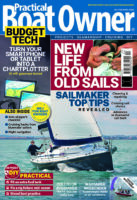"The yacht could have taken any action except the one it did", says MCA chief examiner
PBO contributor
James Stevens’ latest report from the trial of a yachtsman accused
of flouting maritime law.
Royal Navy
lieutenant Roland Wilson’s yacht was involved in a collision with a
120,000-ton Hanne Knutsen tanker during Cowes Week 2011.
His Corby 33 yacht Atalanta was nearly rolled under the bow and was dismasted when the pink
spinnaker wrapped on the ship’s anchor on 6 August, 2011.
Wilson is charged with contravening three Colregs – Convention on the International Regulations for
Preventing Collisions at Sea:
Rule 5; He did not
keep an adequate lookout.
Rule 9b; He
impeded a large vessel in a narrow channel.
Rule 18; He
impeded a vessel constrained by its draft.
Additionally he is
accused of breaching Rule 7 by failing to adequately determine a risk of
collision and Rule 8d as his actions did not result in his vessel passing a
safe distance from the ship.
The trial continued last Friday. Roger Towner, chief examiner of the Maritime and Coastguard
Agency (MCA) was among the witnesses to take to the stand.
He confirmed that
the Colregs apply in the Solent and that the Hanne Knutsen at 14.6m draught was
definitely constrained by its draught and in a narrow channel therefore should
not be impeded by small vessels.
Captain Towner explained
that it is sometimes necessary to make a departure from the rules in order to
avoid a collision.
In this case it
was acceptable for the ship to make a starboard sound signal then slow its turn
in view of the disabled motorboat in its path.
The yacht Atalanta
should have established that a risk of collision existed and taken early action
at an adequate distance. In his opinion the Hanne Knutson was proceeding toward
Gurnard buoy at a safe speed in the circumstances.
Captain Towner thought that if
Atlanta had continued on its easterly course it would have sailed clear. When
asked what the Atalanta should have done he said it could have taken almost any
action except the one it did. To sail across the bow was inexplicable.
Tanker ‘borderline speeding’
Richard Twitchen,
Commodore RN, had written an expert report. In his opinion the escort of one
boat was insufficient to police the prohibited zone. He thought the ship’s
speed was on the borderline of speeding.
He agreed the
Corby 33 was manoeuvrable and that if Atalanta had retained her Easterly course
there would have been no collision but maintained that had she done so she
would have passed across the ship’s bow from port to starboard. Slowing the
rate of turn was the cause of the accident.
Watch a video of the crash here.
The case continues
on Tuesday 22 October and runs until Friday 25 October.
A detailed report
of the trial will be published in the December 2013 issue of PBO.
(Pictures courtesy of Tim Addison at COWES.co.uk)



